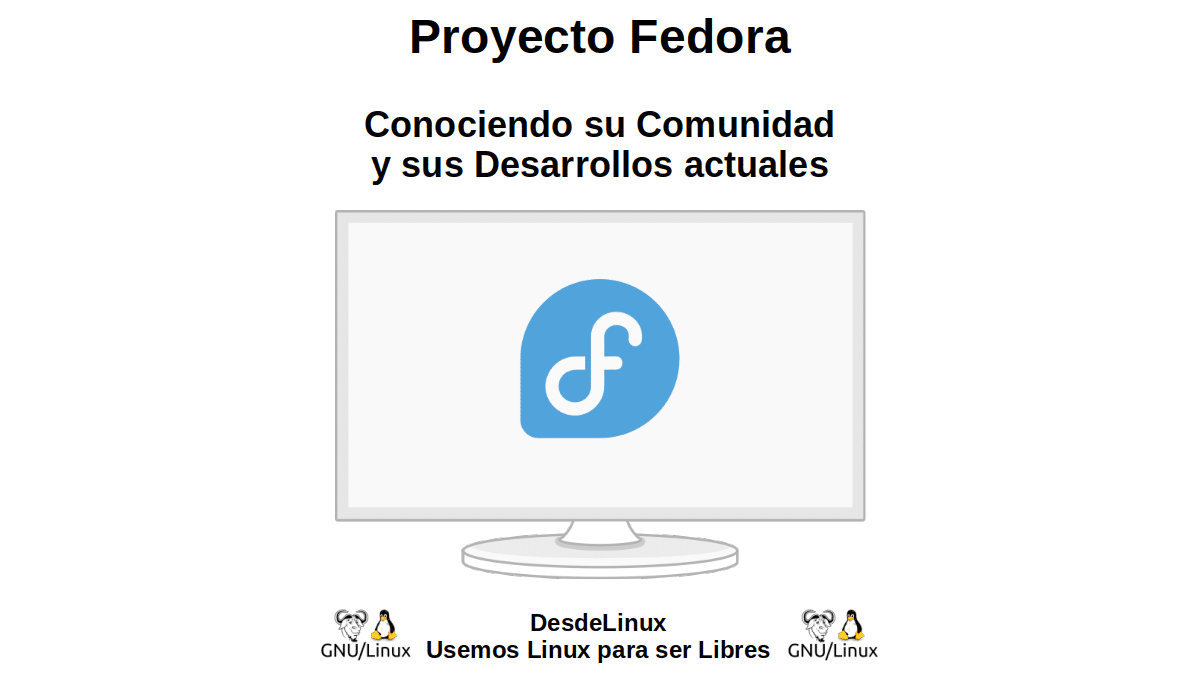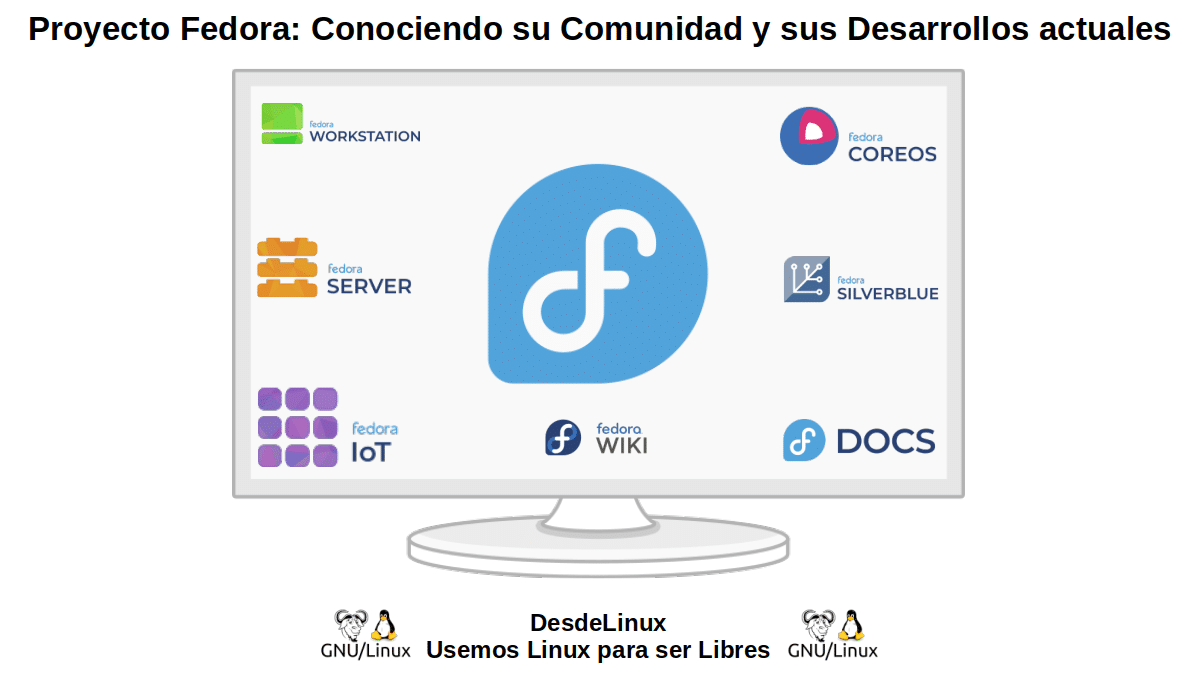
Fedora Project: Knowing Your Community and Its Current Developments
At Universe of free and open projects that revolve around GNU / Linux and the Free Software and Open Source Communities, there are great and great projects that stand out for many valuable points. For example, in the field of GNU / Linux Distributions / Communities highlights Debian, Ubuntu, Mint, Arch and of course, among many others Fedora.
And it is that, within the known "Fedora Project" there is a huge and stupendous Community very dedicated to building cool products and resources for people around the world. And in this post we will take a brief look at many of them.

Fedora 34 has already been released, know what's new
And since it is not the first time that we deal with specific information related to the "Fedora Project", we will immediately leave below some of the most recent links about our previous related posts. So that those interested in exploring them after finishing this publication can easily do so:
"The stable version of Fedora 34 has already been released and is ready for download. This new version of Fedora 34 includes a series of notable improvements that are worth taking into account, since many changes are related to performance improvement and especially hardware-oriented.
For example: All audio streams have been moved to the PipeWire media server, which is now the default instead of PulseAudio and JACK. And in addition to PipeWire which is superior in many respects, the use of Wayland is also taken into account." Fedora 34 has already been released, know what's new





Fedora Project: People Community and Software Platform
What is the Fedora Project?
According to Official website of the "Fedora Project", it is briefly described as:
"An innovative, free and open source platform for hardware, clouds and containers, which enables software developers and community members to build custom solutions for their users."
While, later on they expand their description and scope as follows:
The Fedora Project is a community of people working together to build a free and open source software platform, and to collaborate and share user-centric solutions built on top of that platform. Or, simply put, we create an Operating System and make it easy for you to do useful things with it.
What developments and resources do you currently offer?
Among the many current and current projects and resources, it is worth highlighting and briefly describing the following:
Main projects
- Fedora Workstation: It is a reliable, powerful and easy-to-use Operating System for laptops and desktops. It has been created thought to be highly functional for a wide range of developers, from hobbyists and students to professionals in business environments. It offers a GNOME 3 Desktop Environment along with a complete collection of open source tools.
- FedoraServer: It is a community supported Server Operating System, which gives administrators with experience in any Operating System access to the latest technologies available in the open source community. Among its notable characteristics are its high degree of modularity (handling of versions of applications and installed languages).
- Fedora IoT (Internet of Things): It is an edition of Fedora that provides a solid foundation for IoT ecosystems. It is ideal for projects associated with the home, as in industrial gateways, smart cities or analytics with AI / ML. In addition, it provides a trusted open source platform on which to build a solid and easy-to-upgrade foundation.
Emerging Projects and Available Resources
Others projects and resources existing are:
- Wiki: Collaboration tool for your huge community.
- Shops: Informative and news website for your Community.
- AltDownloads: Section that offers alternative versions of Fedora.
- Docs: Section that collects, centralizes and offers all the necessary user documentation.
- Spins: Project that offers Editions (Spins) of Fedora in Desktop Environments other than GNOME.
- Fedora Labs: Section offering a curated selection of purpose-oriented content and software packages, as curated and maintained by members of the Fedora community.
- CoreOS: Minimalist operating system, with automatic updates and oriented to containers. Their goal is to provide the best container host to run containerized workloads safely and at scale.
- silverblue: Immutable (unalterable) desktop operating system intended to provide good support for container-centric workflows. This variant of Fedora Workstation targets developer communities.
Note: In a next post we will delve a little more about Fedora Silverblue.

Summary
In summary, as can be seen, currently the "Fedora Project" is the successful result of a excellent Community of Users, Developers and other professionals, who have produced excellent free and open developments, and helpful online resources for anyone who wants and needs it.
We hope that this publication will be very useful for the entire «Comunidad de Software Libre y Código Abierto» and of great contribution to the improvement, growth and diffusion of the ecosystem of applications available for «GNU/Linux». And do not stop sharing it with others, on your favorite websites, channels, groups or communities of social networks or messaging systems. Finally, visit our home page at «DesdeLinux» to explore more news, and join our official channel Telegram from DesdeLinux.
That fedora is reliable, it will be that not. Reliable in terms of security, of course it is. But unfortunately in stability, sooner or later it is going to fail you and give you serious problems, because they are very razor-sharp just like arch that when you least expect it it will break if or if. Fedora is my preferred distribution, with that super gnome that there is no other gnome like it in the entire Linux world. But since in the end it ends up breaking, well I don't use it. Instead debian testing, in reality it is the great unknown and people believe that because it is called testing it already breaks you, of course it is testing, hahaha, if it is testing but they are much more conservative than fedora, arch and even delicacy. The packages that come to testing are already suuuper reviewed and at most they can give you some small problem, but nothing serious that you have to reinstall from scratch, unless you use testing with kde and nvidia then yes, it will hit you for sure. I have been with testing for 3 years and it is the distribution that has given me the least problems, specifically, zero problems, I had more problems with stable and serious debian than with testing. Fedora is broken, arch or tell you and manjaro also breaks. Debian testing, does not break, stability in its purest form.
Greetings, Testingsi. Thank you for your comment and input from your experience on Fedora and Debian Testing.
Anyone who has used Fedora in the last 5 years knows that they have nothing to envy Debian in stability and of course Arch in having an updated system. Moreover, the cutting-edge technologies, which are the ones that count, are either earlier or better in Fedora than in Arch, for the simple reason that they are from Fedora. Your comment has nothing to do with the article and perhaps you only entered to upset the spirits. Fedora Workstation is as stable as debian without being obsolete and as modern as arch without breaking stability
The article is excellent and I am looking forward to the review of fedora silverblue.
I am a Fedora Workstation and Silverblue user. I am a former user of debian, openSUSE, Ubuntu, manjaro, arch, convinced that today, the best linux distro is: Fedora Workstation
@Testingsi, exactly Debian testing is absolutely unknown, I agree: people use it without knowing the details. If you talk about good security in Fedora, not stability, Debian testing suffers from the lack of both, on the one hand security updates come * at least * a week after stable (study the handbook on revision cycles of packages in testing), so you can be perfectly several months with expired Firefox or any important package broken due to its update policy, you can do pinning as long as there is no version conflict, and we already know the binding problems that the versions bring in the free software development model.
Greetings, Autopilot. Thank you for your comment and contribution.